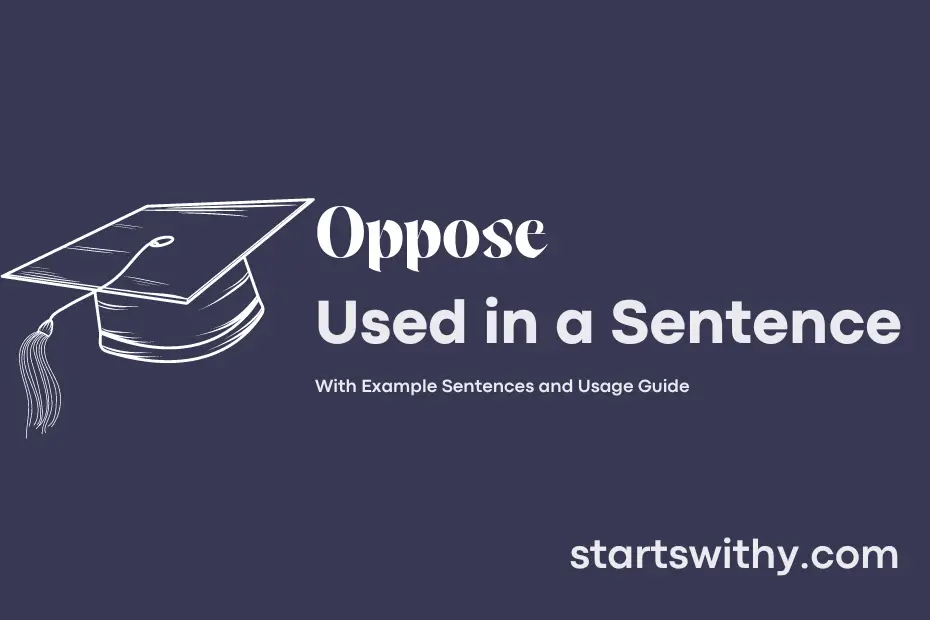Have you ever found yourself in a situation where you strongly disagree or resist a particular idea or action? This act of expressing disapproval or resistance is what we commonly refer to as “oppose.”
Opposing something can be a way to voice your stance on a matter, whether it be a difference in opinion, a conflicting belief, or a refusal to comply with a request. It is a natural response to have differing views or values, and the ability to express opposition allows for healthy debate and diversity of perspectives.
7 Examples Of Oppose Used In a Sentence For Kids
- Oppose the idea of hurting others for fun.
- Always oppose unfairness and be kind to everyone.
- It is important to oppose bullying in any form.
- We should oppose littering and keep our surroundings clean.
- Let’s oppose using rude words and speak kindly to others.
- Remember to oppose any actions that may harm animals.
- We should always oppose being mean to our friends.
14 Sentences with Oppose Examples
- Oppose the use of single-use plastics on campus by promoting eco-friendly alternatives.
- Join student organizations that oppose discrimination and work towards promoting inclusivity on campus.
- Oppose the hike in tuition fees by organizing peaceful protests and petitioning the administration.
- Students can oppose unfair grading practices by raising concerns with the faculty and administration.
- It’s important to oppose any form of academic dishonesty and promote ethical behavior among peers.
- Oppose gender inequality by participating in discussions and events that promote gender equality on campus.
- Take a stand and oppose any form of caste-based discrimination or prejudice within the college community.
- Encourage classmates to oppose any decision that may negatively impact student welfare or academic freedom.
- Students can oppose restrictive campus policies by advocating for more student-centered decision-making processes.
- Stand up against any form of harassment or bullying and actively oppose such behavior in the college environment.
- Oppose the limitation of resources for student activities by advocating for better funding and support from the college administration.
- Support and join initiatives that oppose environmental degradation and promote sustainable practices on campus.
- Take part in debates and discussions to oppose censorship and support freedom of expression in academic settings.
- Encourage open dialogue and healthy discussions among students to oppose radical beliefs or extremist ideologies on campus.
How To Use Oppose in Sentences?
Using oppose in a sentence is a great way to express disagreement or resistance to something. Here are some tips on how to use it effectively:
-
Subject-Verb-Object Structure: The basic structure of a sentence using oppose is subject-verb-object. For example: “She opposes the new policy.”
-
Context: It’s important to provide context when using oppose in a sentence to clarify what is being disagreed with. For instance: “The supervisor opposes the proposal to cut employee benefits.”
-
Prepositions: You can also use prepositions like “to” or “against” after oppose to specify what is being opposed. For example: “Many students oppose the decision to ban cell phones in class.”
-
Tenses: Make sure to match the tense of oppose with the rest of your sentence. For example, in past tense: “They opposed the construction of a new highway.”
-
Variety: Try to vary your sentence structures when using oppose to make your writing more interesting. For instance: “Despite strong opposition from the community, the mayor supports the new tax law.”
Remember to keep these tips in mind when using oppose in a sentence to effectively communicate your disagreement or resistance.
Conclusion
In conclusion, understanding the different ways to construct sentences with the keyword “oppose” is essential for effective communication. By incorporating this keyword into sentences, one can clearly express disagreement, contradiction, or resistance towards a particular idea, action, or belief. Whether stating one’s own opposition or highlighting conflicting perspectives, using “oppose” in sentences helps convey a strong stance and adds clarity to the message being conveyed.
By mastering the usage of sentences with “oppose,” individuals can articulate their viewpoints with precision and assertiveness, fostering meaningful discussions and debates. This keyword serves as a valuable tool in expressing dissenting opinions, challenging prevailing thoughts, and fostering critical thinking. Incorporating sentences with “oppose” in communication enhances the ability to engage in constructive dialogues and effectively express conflicting viewpoints.



